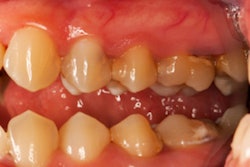
A new study adds to existing evidence that maintaining better oral health can reduce the risk of cancer. Researchers identified links between certain periodontal pathogens and the risk of esophageal cancers, findings which could advance strategies for the early detection and prevention of these malignancies.
New York University (NYU) researchers analyzed data from two large prospective studies and compared the oral microbiomes of participants who were either cancer-free or who were later diagnosed with esophageal cancer. They found that some bacteria were associated with a greater cancer risk, while others were linked to a reduced risk, and they published their findings in Cancer Research (December 2017, Vol. 77:23, pp. 6777-6787).
"Our study indicates that learning more about the role of oral microbiota may potentially lead to strategies to prevent esophageal cancer, or at least to identify it at earlier stages," stated senior study investigator Jiyoung Ahn, PhD, in a press release. "The next step is to verify whether these bacteria could be used as predictive biomarkers."
Ahn is an associate professor of population health and environmental medicine at the NYU School of Medicine and the associate director of population science at the NYU Perlmutter Cancer Center in New York City.
Identifying the bacteria
Improved prevention and detection of esophageal cancers are critical since these cancers are commonly identified at a late stage when survival rates are low, the study authors noted. The main types, esophageal adenocarcinoma and esophageal squamous cell carcinoma, differ in some risk factors. For esophageal adenocarcinoma, the risk factors include gastroesophageal reflux disease, obesity, low fruit and vegetable intake, and smoking. For esophageal squamous cell carcinoma, risk factors include drinking alcohol, low fruit and vegetable intake, and smoking.
“Learning more about the role of oral microbiota may potentially lead to strategies to prevent esophageal cancer, or at least to identify it at earlier stages.”
Additionally, esophageal squamous cell carcinoma, which is the most common esophageal cancer worldwide, is predominant in developing countries, and esophageal adenocarcinoma is the most common type in developed countries.
Research has suggested that microbiota in the upper digestive tract may play a role in esophageal cancer etiology, but no prospective studies have investigated whether they affect esophageal cancer risk.
To learn more, the researchers used data and oral microbiota from studies in which participants were followed for cancer incidence: the National Cancer Institute's Prostate, Lung, Colorectal, and Ovarian (PLCO) Cancer Screening Trial and the American Cancer Society's Cancer Prevention Study II (CPS-II) Nutrition Survey cohort.
The PLCO study is a randomized trial investigating the effects of screening on cancer-related mortality in men and women ages 55 to 74 who were recruited in 1993 through 2001. Its 52,000 control participants provided oral wash samples. The researchers mailed annual questionnaires to determine incident cancers.
More than 184,000 participants in CPS-II ages 50 to 74 completed a mailed baseline questionnaire in 1992. Every two years, they filled out follow-up questionnaires on incident cancers. From 2000 to 2002, 70,004 participants provided oral wash samples.
Participants in both of these cohorts provided oral wash samples by swishing with 10 mL of Scope mouthwash (Procter & Gamble) and expectorating into a tube; the samples were then stored in a biorepository.
The researchers designated as incident cases those participants diagnosed with esophageal cancer after oral wash collection who had no prior cancer history except for nonmelanoma skin cancer. For every case, they identified two matched controls who had provided an oral wash sample, had no cancer history up until the case diagnosis, were from the same cohort as the case, and were the same age, sex, and race as the case.
The current study included 81 esophageal adenocarcinoma cases with 160 matched controls and 25 esophageal squamous cell carcinoma cases with 50 matched controls. After comparing demographic factors between cases and controls, the researchers found the only item significantly different was alcohol drinking, which was associated with esophageal squamous cell carcinoma (p = 0.004).
When they extracted DNA from the samples and assessed the presence of oral bacteria, they found no significant associations between overall microbiota diversity or composition between cases and controls.
However, the researchers found that a doubling of abundance of the periodontal pathogen Tannerella forsythia was associated with a 21% increased risk of esophageal adenocarcinoma (p = 0.04). Additionally, reduced levels of the commensal genus Neisseria and the species Streptococcus pneumoniae were associated with a lower risk of this cancer, as was bacterial biosynthesis of carotenoids.
Abundance of the periodontal pathogen Porphyromonas gingivalis was marginally associated with a higher risk of esophageal squamous cell carcinoma, but the difference was not statistically significant (p = 0.09).
"Our study brings us much closer to identifying the underlying causes of these cancers because we now know that at least in some cases disease appears consistently linked to the presence of specific bacteria in the upper digestive tract," Ahn stated. "Conversely, we have more evidence that the absence or loss of other bacteria in the mouth may lead to these cancers or to gut diseases that trigger these cancers."
More research needed
Despite being the largest study of its kind, the number of case samples included was small, which limited the ability to detect significant associations, the authors noted. Additionally, as the study population was mostly white, the applicability of the results to other populations was limited, they wrote.
Other study limitations included a lack of information on the periodontal status of the participants and of the presence of esophageal cancer precursor conditions, such as gastroesophageal reflux disease and Barrett's esophagus, and related medications used.
Next up, the researchers plan to examine whether ingestion of probiotic pills could alter the oral microbiome and decrease esophageal cancer risk.
"More research is needed to determine whether periodontal disease and/or periodontal pathogens play a role in esophageal adenocarcinoma/esophageal squamous cell carcinoma carcinogenesis," the authors concluded.



















